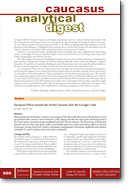The Oppositions Strategy in Azerbaijans 2013 Presidential Elections

Autor(en): Shahin Abbasov
Herausgeber: Denis Dafflon, Lili Di Puppo, Iris Kempe, Natia Mestvirishvili, Matthias Neumann, Robert Orttung, Jeronim Perovic, Heiko Pleines
Serie: Caucasus Analytical Digest (CAD)
Ausgabe: 55
Seiten: 5-7
Verlag(e): Center for Security Studies (CSS), ETH Zurich; Research Centre for East European Studies, University of Bremen; Institute for European, Russian and Eurasian Studies, George Washington University
Publikationsjahr: 2013
